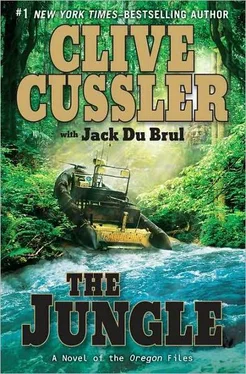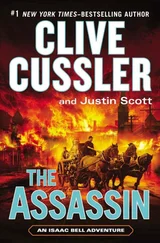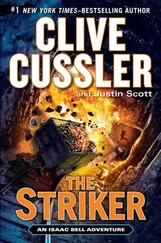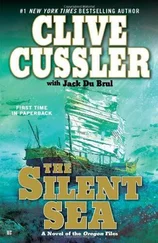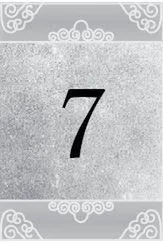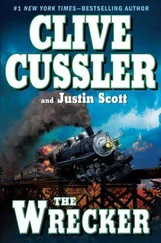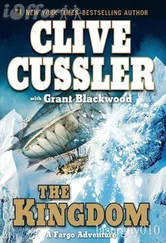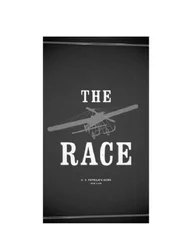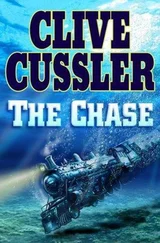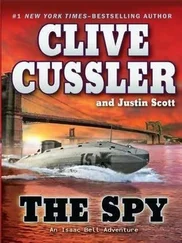Clive Cussler - The Jungle
Здесь есть возможность читать онлайн «Clive Cussler - The Jungle» весь текст электронной книги совершенно бесплатно (целиком полную версию без сокращений). В некоторых случаях можно слушать аудио, скачать через торрент в формате fb2 и присутствует краткое содержание. Жанр: Прочие приключения, на английском языке. Описание произведения, (предисловие) а так же отзывы посетителей доступны на портале библиотеки ЛибКат.
- Название:The Jungle
- Автор:
- Жанр:
- Год:неизвестен
- ISBN:нет данных
- Рейтинг книги:3 / 5. Голосов: 1
-
Избранное:Добавить в избранное
- Отзывы:
-
Ваша оценка:
- 60
- 1
- 2
- 3
- 4
- 5
The Jungle: краткое содержание, описание и аннотация
Предлагаем к чтению аннотацию, описание, краткое содержание или предисловие (зависит от того, что написал сам автор книги «The Jungle»). Если вы не нашли необходимую информацию о книге — напишите в комментариях, мы постараемся отыскать её.
The Jungle — читать онлайн бесплатно полную книгу (весь текст) целиком
Ниже представлен текст книги, разбитый по страницам. Система сохранения места последней прочитанной страницы, позволяет с удобством читать онлайн бесплатно книгу «The Jungle», без необходимости каждый раз заново искать на чём Вы остановились. Поставьте закладку, и сможете в любой момент перейти на страницу, на которой закончили чтение.
Интервал:
Закладка:
The arrow hit the pile of bags near the base of the gate at the same moment a bucket of water was tossed off the parapet. The flame turned to white smoke and steam, and then nothing. Time on a battlefield has an elasticity that defies all logic. It seemed forever elapsed, but it was less than a half second before the last dying ember of the arrowhead burned its way through the bag and touched off the contents inside.
Alchemists searching for the Elixir of Life had stumbled upon the ratio and composition of chemicals, and so it was called huŏ yào , or Fire Medicine. The world would later know it as gunpowder.
Because it is a slow-burning explosive, gunpowder needs to be compressed to do much more than flash and sizzle. The first bag burst into smoky flame, igniting others on the outside of the pile, until flames were shooting dozens of feet into the air. The pyre was enough to detonate the bags buried at the base of the mound, and the weight of the sacks above tamped the expanding gases long enough to produce a titanic explosion.
The concussion wave rippled across the field, sending a wall of hot air as far as the general and his remaining foot soldiers. The blast knocked the ambassador off his horse, and to him it felt as though he’d stood before a potter’s kiln. Flame and smoke rose high into the air, while on the other side of the wall the gates were blown inward and shredded. The debris scythed down anyone in its way, while archers and lookouts along the parapet were tossed like limp dolls, their cries shrieking over the roar of the blast.
The Khan’s man slowly regained his feet. The ambassador’s ears were ringing, and when he closed his eyes, the afterimage of the explosion was burned on the inside of his lids. This was the second miracle weapon he had seen today. First the light gun and now some means of containing fire in bags and unleashing it all at once. Truly this was an amazing land.
On the battlefield, the scattered horsemen turned as though a shoal of fish and began charging for the destroyed gates, where wood smoldered and the dazed defenders ambled in shock. Swords were unsheathed and reflected the sunlight brightly now that the cloud had moved on. The men in the towers searched for victims, but the explosion had taken the fight out of the garrison.
General Khenbish released his reserves of foot soldiers to follow after the cavalry. With a roar almost as loud as the blast of gunpowder, the men tore off across the field, eager to do the Khan’s work and restore his honor from being robbed and, worse, made to look weak because of it. They would spare the comeliest women, and boys who could be used as slaves, but everyone else in the town would be put to the sword and the entire village razed. The local warlord’s head would be placed on a pike in the nearest settlement as a reminder for those who thought their Khan’s wrath was not swift and all-consuming.
“I wish to know more of your amazing arsenal,” the ambassador said as he and Khenbish dismounted. It wasn’t common practice for the general himself to take part in the slaughter, and the ambassador had no desire to see what was happening on the other side of the wall.
“I will introduce you to my alchemist. He can explain both in greater detail than I. For me it is enough that they work.” An aide handed him a bone-porcelain cup of strong tea.
As they started off toward the copse of trees where camp servants and staff waited to treat any wounded from the battle, the ambassador mused that there were so many remarkable things that he’d witnessed during his years roaming this strange nation. Some things he would never reveal, like the intimacies he’d enjoyed with some of the Khan’s concubines. And some things he would never discuss because they were just too bizarre to be believed. Like the Great Wall—it had the height and breadth of a five-story stone building and yet it stretched from horizon to horizon and beyond. It alone dwarfed every bit of Roman engineering that lay across Europe. There were the rocklike bones of dragons he’d been shown in the central desert, skulls as big as wine barrels, with teeth like daggers and femurs as tall as a man. And then there was what he saw today: a device capable of throwing light intense enough to blind a man.
For his own sake he wanted to know how this weapon operated—Khenbish had mentioned a crystal of some sort—but he knew that this was one more mystery he would take to his grave.
Marco Polo strode alongside the general, unsure that his fellow Venetians would believe even the more banal stories he could tell about his travels in China.
1
BIRMINGHAM, ENGLAND
FOUR MONTHS AGO
WILLIAM CANTOR HAD SNEEZED INTO THE MICROPHONE before he knew he was about to. The need hit him that hard, and he didn’t have the chance to turn his head away. The phlegm the sneeze had discharged into his nasal passages had to be snorted back, and that amplified sniff echoed through the nearly deserted meeting room.
“Sorry,” he said miserably and coughed, covering his mouth and turning away so as to show the ten-odd people here for his lecture that he wasn’t a complete philistine. “As an American I knew at Christ Church College said”—that’s right, you rubes, I went to Oxford —“ I can shake a hand, I can shake a leg, but I sure can’t shake this cold.”
The response from the crowd might have been polite laughter or, most likely, a muted cough.
God, how he hated these lectures, the ones in annex buildings or village libraries, where the only attendees were pensioners with no interest in the subject but nothing better to do with their afternoons. Worse than those, actually, were the ones in cities such as Birmingham, so blighted that the sun never seemed to shine, and the people in the room were just here to get warmed up before heading out to panhandle or line up at soup kitchens. He had counted ten attendees before taking the lectern and no fewer than fourteen overcoats. He imagined a string of rusted shopping carts, overladened with detritus, in the library car park.
“ ‘I have not told half of what I saw.’” A much better opening line than spraying the microphone with bogies, Cantor thought ruefully. Still, he had goals, and one never knew, maybe the bundledup woman toward the back of the fluorescent-lit room was secretly J. K. Rowling in mufti. “These were the last words uttered by the great Venetian explorer Marco Polo upon his deathbed.
“We know from his legendary book, The Travels of Marco Polo , dictated to Rustichello da Pisa while both languished in a Genoese prison, that Polo, along with his father, Niccolò, and uncle, Maffeo”—the names tripped off Cantor’s tongue despite his head cold, this being far from the first time he had given this particular talk—“that he made many incredible discoveries and beheld many amazing sights.”
There was a disturbance at the back of the room as a newcomer entered from the library’s brutalist-style reading room. Metal folding chairs creaked as a few people turned to see who had come to hear the speech, probably assuming it was a homeless buddy coming in from Chamberlain Square.
The man wore a cashmere overcoat that nearly swept the floor over a dark suit, dark shirt, and a matching dark tie. Tall and big, he gave an apologetic wave and took a seat in back before Cantor could see his features. This looked promising, the cash-strapped scholar thought. At least this bloke was wearing clothes that hadn’t already been discarded a few times.
Cantor paused long enough for the gentleman to settle. If this was a potential financial backer, he might as well start licking the guy’s boots now.
“Even in his day, Polo’s Travel s sparked debate. People simply didn’t believe he had seen and done all that he claimed. They couldn’t look past their own prejudices to believe that there was another separate civilization that could rival or even surpass the European states. Later, a glaring omission arose. Simply stated, for all his years in China, and all that he wrote of that distant land, he never once mentioned its greatest achievement, its most iconic image.
Читать дальшеИнтервал:
Закладка:
Похожие книги на «The Jungle»
Представляем Вашему вниманию похожие книги на «The Jungle» списком для выбора. Мы отобрали схожую по названию и смыслу литературу в надежде предоставить читателям больше вариантов отыскать новые, интересные, ещё непрочитанные произведения.
Обсуждение, отзывы о книге «The Jungle» и просто собственные мнения читателей. Оставьте ваши комментарии, напишите, что Вы думаете о произведении, его смысле или главных героях. Укажите что конкретно понравилось, а что нет, и почему Вы так считаете.
